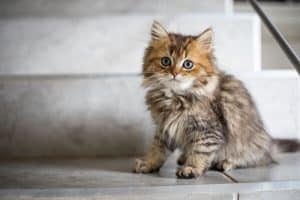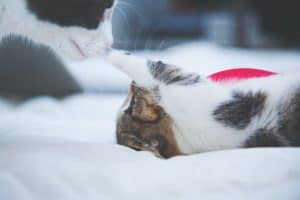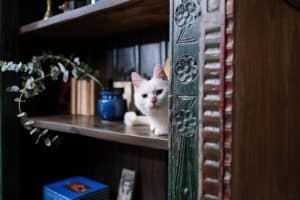Have you ever noticed your adult cat exhibiting playful behaviors usually associated with kittens? It’s not uncommon for mature felines to act like young ones, and there are several reasons behind this fascinating phenomenon. In this blog post, we will explore why your adult cat may be displaying kitten-like behaviors and what you can do to understand and address this behavior.
Playful Nature vs. Maturity
Let’s face it, cats are known for their playful and curious nature, no matter their age. Just like humans, they enjoy having fun and exploring their surroundings. This natural tendency to play is ingrained in them from a young age and continues into adulthood. So, if you find your adult cat acting like a kitten, chasing after toys, or pouncing on imaginary prey, it’s perfectly normal!
Cats use play as a way to exercise, sharpen their hunting skills, and release pent-up energy. It’s also a way for them to relieve stress and boredom. Remember, playtime for cats is not just about fun; it serves a vital purpose in their overall well-being. So, the next time you catch your adult cat engaging in playful antics, embrace it and join in on the fun!
Stress and Anxiety
Believe it or not, stress and anxiety can also play a significant role in why your adult cat is acting like a kitten. Cats are sensitive creatures that can easily become stressed by changes in their environment, loud noises, or even a disruption in their routine. When cats experience stress or anxiety, they may revert to playful behaviors as a coping mechanism.
If you notice your adult cat exhibiting kitten-like behavior such as excessive playfulness, running around frantically, or being overly vocal, it could be a sign that they are feeling overwhelmed. Providing a calm and stable environment, plenty of enrichment, and interactive playtime can help alleviate stress and anxiety in your feline friend.
Remember, just like humans, cats can experience emotions and respond to stress in different ways. Understanding the root cause of their behavior and offering them support and reassurance can go a long way in helping them feel more secure and content.
3. Health and Medical Issues
Just like humans, cats can also experience health issues that might cause them to act more like kittens. If your adult cat suddenly starts behaving more playfully than usual, it’s crucial to consider potential health issues as a cause. Dental problems such as toothaches or gum disease can make your cat act more kitten-like, as the pain may trigger playful behavior as a coping mechanism. Hyperthyroidism, a common condition in older cats, can also lead to increased energy levels and hyperactivity, resembling kitten behavior. Arthritis or joint pain can cause discomfort, prompting your cat to engage in playful activities to distract themselves from the pain.
Additionally, certain medical conditions like neurological disorders or cognitive dysfunction can affect your cat’s behavior and make them more prone to acting like a kitten. It’s essential to consult with your veterinarian if you notice any sudden changes in your cat’s behavior to rule out underlying health issues and provide appropriate treatment if needed.
4. Boredom and Lack of Stimulation
It’s essential to understand that cats, regardless of age, require mental and physical stimulation to stay happy and healthy. If your adult cat is acting like a kitten, it could be a sign of boredom or a lack of stimulation in their environment. Cats are naturally curious and playful animals, and without proper enrichment, they may revert to kitten-like behaviors to entertain themselves.
To prevent boredom and encourage your cat to exhibit more mature behavior, provide interactive toys and puzzles that stimulate their mind and satisfy their hunting instincts. Rotating toys regularly can also keep things interesting for your cat. Engaging in regular play sessions with your cat using toys like feather wands or laser pointers can help channel their energy in a positive way and prevent them from acting out due to boredom.
Remember, a mentally and physically stimulated cat is a happy cat, so make sure to create an enriching environment that keeps your furry friend entertained and engaged.
Additional Unique Insight:
- Create a “cat-friendly” environment by setting up vertical spaces like cat trees or shelves, where your cat can climb and perch to observe their surroundings. This can help reduce boredom and provide mental stimulation for your cat.
5. Socialization and Past Experiences
Early socialization and past experiences play a big role in shaping a cat’s behavior in adulthood. Cats that had positive interactions and exposure to different environments as kittens are more likely to retain their playful and kitten-like behaviors as adults. On the other hand, cats with limited socialization or negative experiences may exhibit more fearful or skittish behaviors.
If your adult cat is acting like a kitten, it could be a result of their past experiences influencing their behavior. Providing a safe and enriched environment with plenty of opportunities for play and socialization can help your cat feel more secure and continue to exhibit playful behaviors.
6. Attention Seeking
Cats are notorious attention-seekers, and engaging in playful behaviors is often a way for them to seek attention from their owners. When your adult cat displays kitten-like behaviors such as chasing after toys, pouncing, or meowing for attention, it’s their way of interacting with you and seeking validation.
To satisfy your cat’s need for attention, make sure to spend quality time playing and bonding with them daily. Interactive toys, puzzle feeders, and regular play sessions can help fulfill your cat’s mental and physical stimulation needs, reducing the likelihood of attention-seeking behaviors. Remember, a happy and engaged cat is more likely to act playful and kitten-like!
Additional insight: Cats may also display kitten-like behaviors as a way to bond with their owners or other pets in the household. Engaging in playtime together can strengthen the bond between you and your cat, promoting a sense of trust and companionship.
7. Ways to Encourage Appropriate Behavior
If your adult cat is displaying kitten-like behavior, there are several strategies you can use to manage and redirect their actions. First, ensure your cat has plenty of interactive toys to keep them mentally and physically stimulated. Engaging activities like puzzle feeders or laser pointers can help satisfy their playful instincts.
Additionally, provide designated scratching posts and climbing structures to redirect your cat’s energy in a positive way. Regular playtime and exercise are vital for adult cats, so dedicate time each day to engage in interactive play sessions to bond with your furry friend and release excess energy.
Consistency is key when addressing unwanted behaviors. Use positive reinforcement techniques, such as rewarding good behavior with treats or praise, to encourage appropriate conduct. Avoid punishment, as this can lead to anxiety and further behavioral issues.
Lastly, if your cat continues to exhibit excessive kitten-like behavior, consult with a veterinarian or animal behaviorist to rule out any underlying health issues or to develop a customized behavior modification plan. Remember, patience and understanding are essential when guiding your adult cat towards more appropriate behavior.
Additional Tip:
– Consider incorporating vertical spaces in your home, such as cat trees or shelving, to give your cat a sense of security and ownership over their environment.
8. Interesting Fact: Cats are Crepuscular
Did you know that cats are crepuscular animals? This means they are most active during dawn and dusk, aligning with their natural hunting instincts. While domestication has altered some of their behavior, many cats still exhibit peak activity levels during these times. Understanding your cat’s crepuscular nature can help you plan play and feeding schedules that cater to their natural rhythms.
By incorporating play sessions and feeding times during these peak activity periods, you can help prevent boredom and curb excessive kitten-like behavior in your adult cat. Embracing your cat’s crepuscular nature can enhance their overall well-being and strengthen the bond between you and your feline companion.
Alex, a passionate animal lover, has experience in training and understanding animal behavior. As a proud pet parent to two dogs and three cats, he founded AnimalReport.net to share insights from animal experts and expand his knowledge of the animal kingdom.




